Amir raspberry variety
There are common raspberry varieties, there are good, not very good, summer, remontant, and there are simply legendary varieties. Polka belongs to such, the best in many respects in its class, with which other representatives of culture are compared. This is a famous and very common Polish remontant of the breeder Jan Danek, with excellent berry quality, transportability, and yield. Just like the Canadian Tulamin, which has become a real standard of taste for summer raspberries.
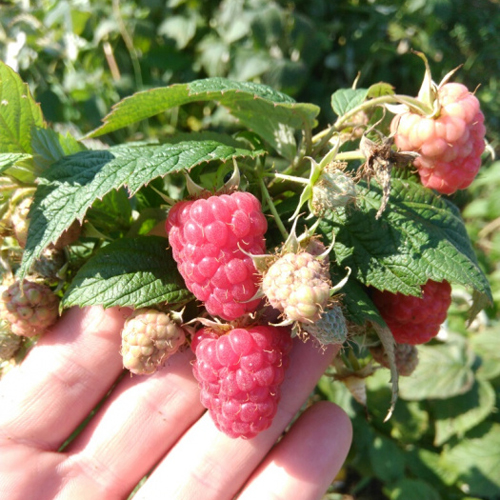
Breeders from the Italian nursery Berryplant began experiments on crossing Polka and Tulamin in 2000. After two generations, the seedlings of the variety named after the capital letters "Berriplant" - BP 1 (BP 1) were selected. The new variety has taken all the best from its "star" parents. It became widely known under the trademark officially registered in many countries - Amira®.
Description
This is an early remontant, fruiting on the shoots of the current year begins from mid-July in the southern regions, in the more northern ones from late July-early August. The berry harvesting season is quite concentrated, 80% of the harvest is harvested in a month. Some leave Amira for a second wave of fruiting, cutting off the stems 2/3 of the length in the fall. Then the harvesting season begins in June on the shoots of last year. But more and more experts in the field of raspberry cultivation agree that it is impractical, and it is more effective to grow our heroine in an annual culture. And that's why:
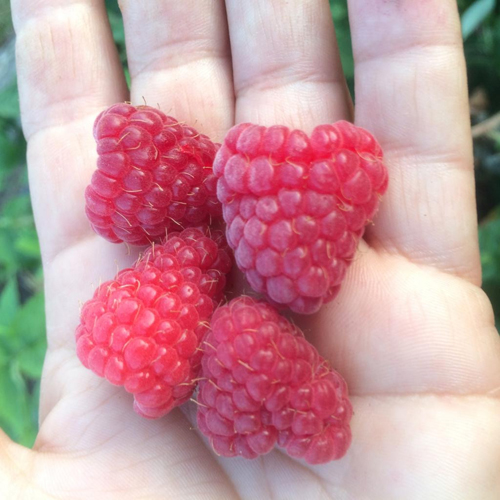
- berries of autumn fruiting are much larger in size, with a richer color;
- the harvest itself is much larger than the summer one;
- summer fruiting requires good care (regular watering, fertilizing, chemical treatments), and this does not pay off economically.
Amira's bush is vigorous, but compact, not spreading. Shoots are thick, powerful, from 1.5 to 2 meters in height, densely pricked (like Tulamin), erect, but under the weight of numerous large berries they can lean to the ground, which requires the installation of a trellis for successful cultivation. Raspberries reproduce well, shoot formation is active. Leaves are bright green, medium-wrinkled, whitish on the inside, serrated.
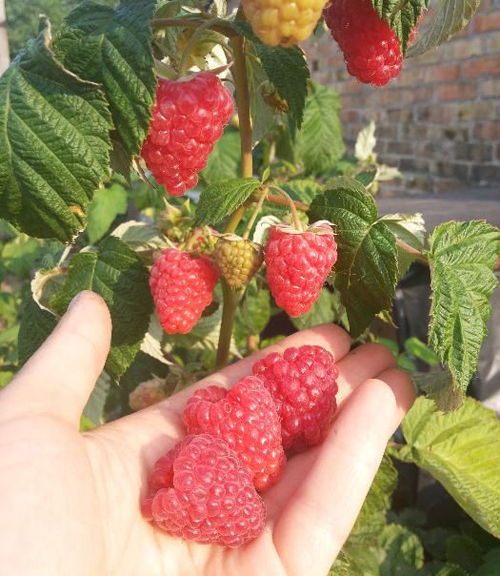
Shoots with numerous laterals, located in a heap, bear fruit along their entire length. From one shoot, you can get from 800 grams and up to 1 kg of berries with proper care. The yield is 12-14 tons per hectare, but it can go up to 15-16 tons, which is 20-30% more than the Shelf's indicators.
The berries are large and very large, beautiful, one-dimensional, oval-cone-shaped, bright red in color (and, unlike the Shelf, practically do not darken after harvesting). The average weight of Amira's fruits in the season is 4-5 grams, but they can gain 8 grams. They are of excellent quality, with excellent taste, sweet, aromatic, even after rains and during a cold snap do not become sour. The drupes are large, but tightly interconnected, so the fruits do not crumble.
The berries of this raspberry are easily removed from the fruit plant, with a dry separation (they do not emit juice). When fully ripe, they do not crumble from the bush for a long time, which significantly increases the productivity of collection. The fruits have very good transportability and excellent keeping quality - up to 3-5 days, and according to some reports, even up to a week when stored in the refrigerator, while the berries do not lose their marketable and consumer qualities. In this they resemble the fruits of another leader in terms of keeping quality - Maravillas.
The advantages of our heroine include the large size and excellent appearance of the berries, their density, good keeping quality and taste, excellent yield of the variety, as well as its low growing requirements.According to the totality of all these positive qualities and according to the numerous admiring reviews of large farms and ordinary summer residents, Amira is an excellent choice for both growing berries for sale and for personal consumption, as well as for processing and freezing. This raspberry is now one of the best on the market, and this is a well-founded claim.
Author: Maxim Zarechny.
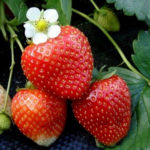
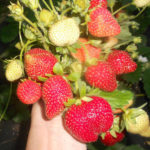
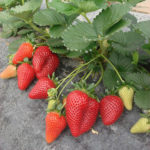
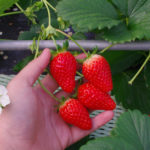
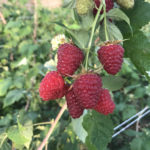
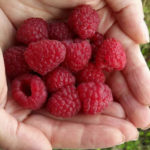



I have been growing Amira for a long time. This variety caught my attention for its abundance of crops and its ability to tolerate transportation well. It is these qualities of berries that have provided me with the opportunity to receive additional income to the family budget for several years now. Of course, you can also add an excellent berry taste here, but unfortunately, it is very dependent on weather conditions (in cold rainy weather, the berry is not so sweet compared to when it is warm and sunny). However, this is a mere trifle compared to its beneficial properties.
If we talk about the problems that can be encountered in the cultivation of this variety, then there are few of them: in a drought, the raspberry requires watering (however, like any variety), otherwise the berry will be small, and in wet weather you need to ensure that raspberries are not picked on time fungal diseases have started. Then you have to say goodbye to most of the harvest. To avoid losses, we collected the fruit even in rainy weather and processed it into jam, juice or wine.
Another disease that can destroy crops is rust. First, it infects the leaves, then moves to the berries. We fight with it with the help of copper sulfate, processing the bushes in early spring and late autumn. Unfortunately, as I was convinced from my own experience, if the disease has occupied most of the raspberry tree, it is better to transfer it to a new site.
I love raspberries. At the dacha, I planted several varieties and already managed to appreciate Amira's advantage. The bushes reproduce well, the berries are large, located on the branch along the entire length. They look beautiful and delicious! It is also convenient that when harvesting, the fruits do not crumble. In general, raspberries are unpretentious, resistant to diseases and adverse weather conditions. From it I make jam, ice it, keep it fresh with sugar. Since her bushes are tall, I put a trellis under them so that the branches do not break.